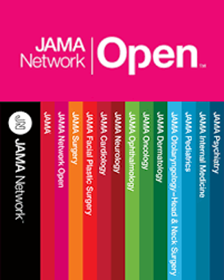Kidney Outcomes Following Angiotensin Receptor-Neprilysin Inhibitor vs Angiotensin-Converting Enzyme Inhibitor/Angiotensin Receptor Blocker Therapy for Thrombotic Microangiopathy
IF 10.5
1区 医学
Q1 MEDICINE, GENERAL & INTERNAL
引用次数: 0
Abstract
ImportanceThrombotic microangiopathy (TMA) on kidney biopsy is a pattern of endothelial injury commonly seen in malignant hypertension (mHTN), but treatment strategies are not well established.ObjectiveTo evaluate the kidney outcomes of angiotensin receptor-neprilysin inhibitor (ARNI), specifically sacubitril/valsartan, vs angiotensin-converting enzyme inhibitor (ACEI) or angiotensin receptor blocker (ARB) therapy for patients with mHTN-associated TMA.Design, Setting, and ParticipantsThis single-center cohort study enrolled consecutive patients in China diagnosed with mHTN-associated TMA through kidney biopsy from January 2008 to June 2023. Follow-up was conducted until the conclusion of the study period. Data were analyzed in September 2023.ExposuresTreatment with sacubitril/valsartan or ACEI/ARBs during hospitalization and after discharge.Main Outcomes and MeasuresThe primary outcome was a composite of kidney recovery: a 50% decrease in serum creatinine level, decrease in serum creatinine levels to the reference range, or kidney survival free from dialysis for more than 1 month. The secondary and tertiary outcomes were a 15% increase in the estimated glomerular filtration rate (eGFR) relative to baseline and kidney survival free from dialysis, respectively. Propensity score matching (PSM) and Cox proportional hazards regression analysis were used to evaluate the association between sacubitril/valsartan and ACEI/ARB therapy with kidney recovery outcomes.ResultsAmong the 217 patients (mean [SD] age, 35.9 [8.8] years; 188 men [86.6%]) included in the study, 66 (30.4%) received sacubitril/valsartan and 151 (69.6%) received ACEI/ARBs at baseline. Sacubitril/valsartan treatment was associated with shorter time to the primary outcome compared with ACEI/ARB treatment (20 of 63 [31.7%] vs 38 of 117 [32.5%]; adjusted hazard ratio [aHR], 1.85; 95% CI, 1.05-3.23). Sacubitril/valsartan treatment was independently associated with shorter time to a 15% increase in eGFR (15 of 46 [32.6%] vs 46 of 83 [55.4%]; aHR, 2.13; 95% CI, 1.09-4.17) and kidney survival free from dialysis (11 of 23 [47.8%] vs 16 of 57 [28.1%]; aHR, 2.63; 95% CI, 1.15-5.88) compared with ACEI/ARB treatment. These differences remained significant in the PSM comparison.Conclusions and RelevanceIn this cohort study, sacubitril/valsartan treatment was associated with a potential kidney function benefit in patients with mHTN-associated TMA compared with ACEI/ARB treatment. The findings suggested that sacubitril/valsartan could be a superior therapeutic approach for managing this serious condition in terms of kidney recovery.血管紧张素受体-肾素抑制剂与血管紧张素转换酶抑制剂/血管紧张素受体阻滞剂治疗血栓性微血管病后的肾脏预后
重要性肾活检发现的血栓性微血管病(TMA)是恶性高血压(mHTN)中常见的内皮损伤模式,但治疗策略尚未明确。目的评估血管紧张素受体-肾素抑制剂(ARNI),特别是沙库比曲/缬沙坦,与血管紧张素转换酶抑制剂(ACEI)或血管紧张素受体阻滞剂(ARB)治疗 mHTN 相关 TMA 患者的肾脏疗效。这项单中心队列研究招募了2008年1月至2023年6月期间通过肾活检确诊为mHTN相关TMA的中国连续患者。随访至研究结束。主要结果和测量指标主要结果是肾脏恢复的综合指标:血清肌酐水平下降50%、血清肌酐水平降至参考范围或肾脏存活1个月以上,无需透析。二级和三级结果分别是估计肾小球滤过率(eGFR)相对于基线提高15%和肾脏存活率不再透析。研究采用倾向得分匹配 (PSM) 和 Cox 比例危险度回归分析评估了沙库比特利/缬沙坦和 ACEI/ARB 治疗与肾脏恢复结果之间的关系。结果在纳入研究的 217 名患者(平均 [SD] 年龄为 35.9 [8.8] 岁;188 名男性 [86.6%])中,66 人(30.4%)在基线时接受了沙库比特利/缬沙坦治疗,151 人(69.6%)接受了 ACEI/ARB 治疗。与 ACEI/ARB 治疗相比,Sacubitril/缬沙坦治疗与更短的主要结局时间相关(63 例中的 20 例 [31.7%] vs 117 例中的 38 例 [32.5%];调整后危险比 [aHR],1.85;95% CI,1.05-3.23)。与 ACEI/ARB 治疗相比,Sacubitril/缬沙坦治疗与更短的 eGFR 增加 15% 的时间(46 例中的 15 例 [32.6%] vs 83 例中的 46 例 [55.4%];aHR,2.13;95% CI,1.09-4.17)和免于透析的肾脏存活率(23 例中的 11 例 [47.8%] vs 57 例中的 16 例 [28.1%];aHR,2.63;95% CI,1.15-5.88)独立相关。结论和相关性在这项队列研究中,与 ACEI/ARB 治疗相比,sacubitril/缬沙坦治疗与 mHTN 相关 TMA 患者的潜在肾功能获益相关。研究结果表明,就肾脏恢复而言,沙库比妥/缬沙坦可能是治疗这种严重疾病的一种更优越的治疗方法。
本文章由计算机程序翻译,如有差异,请以英文原文为准。
求助全文
约1分钟内获得全文
求助全文
来源期刊

JAMA Network Open
Medicine-General Medicine
CiteScore
16.00
自引率
2.90%
发文量
2126
审稿时长
16 weeks
期刊介绍:
JAMA Network Open, a member of the esteemed JAMA Network, stands as an international, peer-reviewed, open-access general medical journal.The publication is dedicated to disseminating research across various health disciplines and countries, encompassing clinical care, innovation in health care, health policy, and global health.
JAMA Network Open caters to clinicians, investigators, and policymakers, providing a platform for valuable insights and advancements in the medical field. As part of the JAMA Network, a consortium of peer-reviewed general medical and specialty publications, JAMA Network Open contributes to the collective knowledge and understanding within the medical community.
文献相关原料
| 公司名称 | 产品信息 | 采购帮参考价格 |
|---|
 求助内容:
求助内容: 应助结果提醒方式:
应助结果提醒方式:


